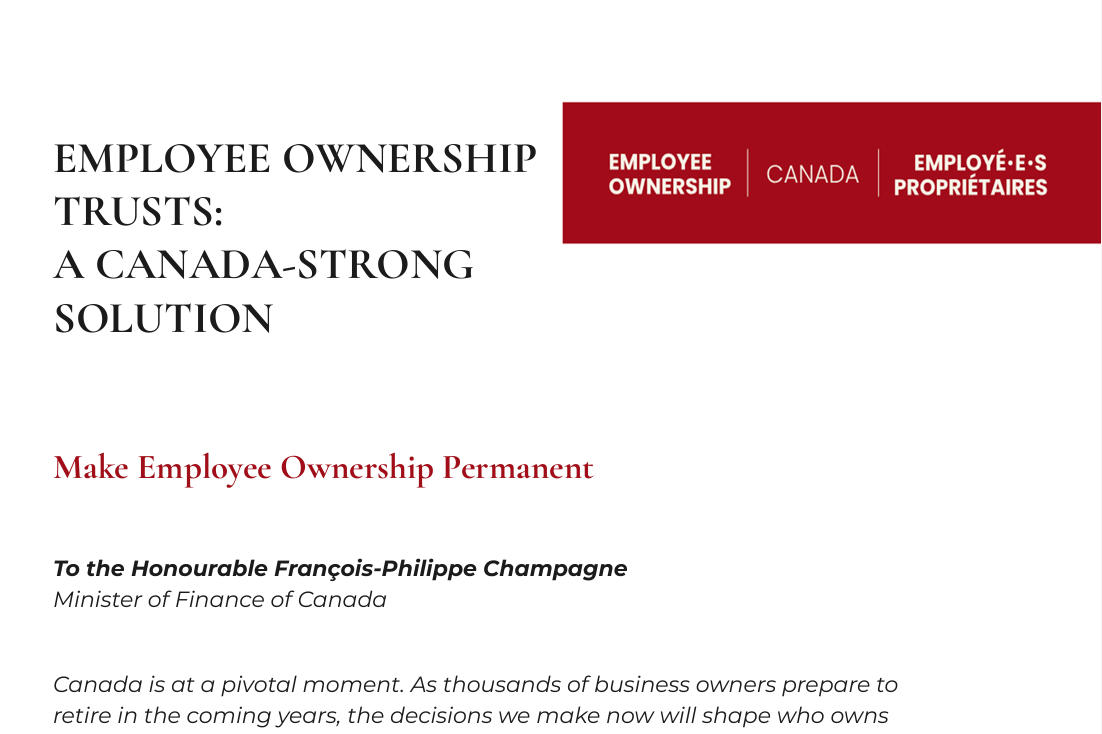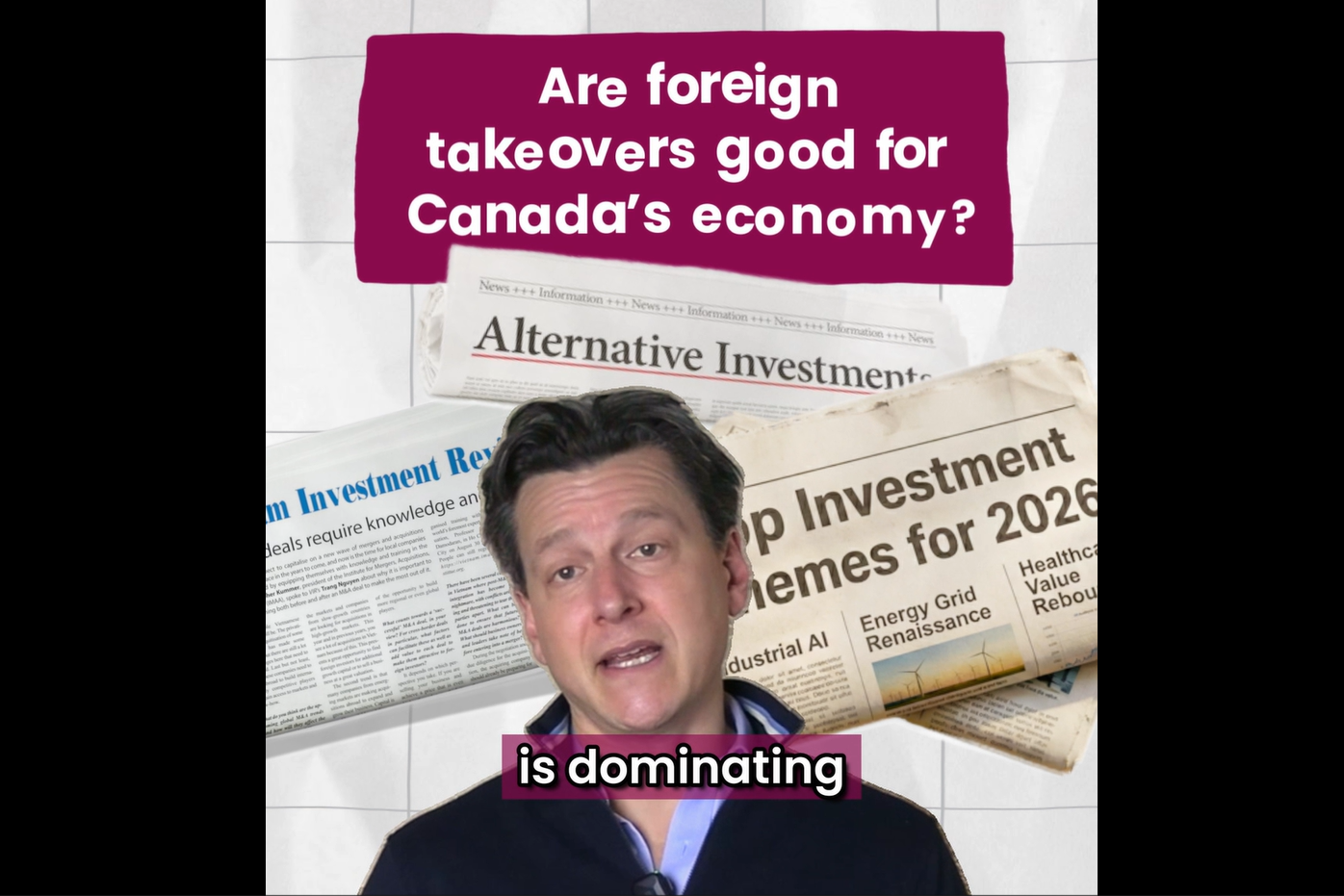Our Work
Over the past thirty years, most of the benefits of economic growth have gone to the wealthy. We want to help fix that with ideas and policies that create more opportunities for working people to build wealth and own assets.
The Ownership Solution
This special series features policy solutions that help more workers and communities profit from the value they create. We can redesign how our economy is owned so more Canadians benefit.
Watch the video: Why would a company sell to its employees?
Canada is facing a $2-trillion business handoff. What if employees owned more of it? In this video, our Director of Policy Dan Skilleter explains why a company would sell to its own employees, how it happens and who stands to benefits. Spoiler alert: employee-owned companies are shown to be 8-12% more productive, share more wealth with their workers, keep businesses Canadian-owned and shore up the resilience of local communities and the broader economy.
How Canada can curb the serial acquisitions quietly reshaping our economy
In many cases, threats to the affordability of everyday goods and services are the byproduct of what competition experts call serial acquisitions—a pattern of larger firms buying up a series of smaller players to try and corner the market. As Michelle Arnold and Kiran Gill explain, a fair and competitive economy does not emerge by accident. The Competition Bureau's proposed Merger Enforcement Guidelines will play an important role in preventing bigger firms from creating unfair playing fields that hurt Canadian small businesses, workers and consumers. The next step for the bureau should be aggressive enforcement of the new guidelines.
Sign the open letter | Make the Employee Ownership Trust incentive permanent
Employee Ownership Trusts (EOTs) offer a practical succession pathway that keeps businesses Canadian-owned, empowers employees to share in the value they help create and supports long-term investment in our communities. With the right policy support, employee ownership can be a strong, proven path forward for Canada’s economy. If this is something you support too, you are invited to read and sign Employee Ownership Canada’s national open letter.
Watch the video: Are foreign takeovers good for Canada’s economy?
We all want more investment in Canada's economy. But as SCP Chair Jon Shell explains in this video, when it comes to foreign investment in the Canadian economy, or FDI, we have to ask: is it investment that builds? Or investment that buys? Because these are two very different things.
The Latest
Watch the video: Why do Canadians work so hard and get so little?
Low productivity means lower wages and a lower standard of living. Canada does need to boost productivity—but we keep trying the wrong things. Watch SCP CEO Matthew Mendelsohn explain the productivity conversation Canada actually needs to have.
Market study submission: Competition in financing for Canada’s SMEs
Small- and medium-sized businesses (SMEs) face significant barriers to accessing capital and we believe that the lack of competition in the banking sector is one of several important contributing factors. We provided comment on the Competition Bureau's upcoming market study on SME financing because we believe that unlocking capital for SMEs and entrepreneurs will strengthen the Canadian economy, bolster our sovereignty and provide more Canadians with pathways to building wealth. We look forward to seeing how the evidence collected will help inform policymakers interested in tackling this issue.
From Guidelines to Action: Feedback on the Proposed Merger Enforcement Guidelines
The Competition Bureau's proposed Merger Enforcement Guidelines represent meaningful progress against trends towards corporate consolidation in Canada. In our formal feedback submission to the bureau, Social Capital Partners outlines that we strongly support the new guidelines. However, we believe that the operationalization of these guidelines will be the real test of their impact. Guidance documents shape expectations, but enforcement outcomes shape behaviour. Serial acquirers are sophisticated actors who model regulatory risk into their strategies. To succeed, the bureau must demonstrate visible capacity to track, analyze and challenge roll-up patterns that are driving up prices and sacrificing quality and service in key sectors.
Featured Research
Elbows up: A practical program for Canadian sovereignty | Report
Canada can’t become a sovereign country by doing the same old things, explains a new compendium of essays co-sponsored by the CCPA, the Centre for Future Work and several national civil society organizations. Elbows Up: A Practical Program for Canadian Sovereignty is a response to corporate rallying cries responding to Donald Trump with a familiar playbook: deregulation, austerity, tax cuts and fossil fuel expansion. The collection includes contributions from 20 progressive economists and policy experts, including SCP CEO Matthew Mendelsohn and others who participated in the Elbows Up Economic Summit held in September 2025 in Ottawa.
Keep up to date on SCP’s latest work
Subscribe to our eNews






